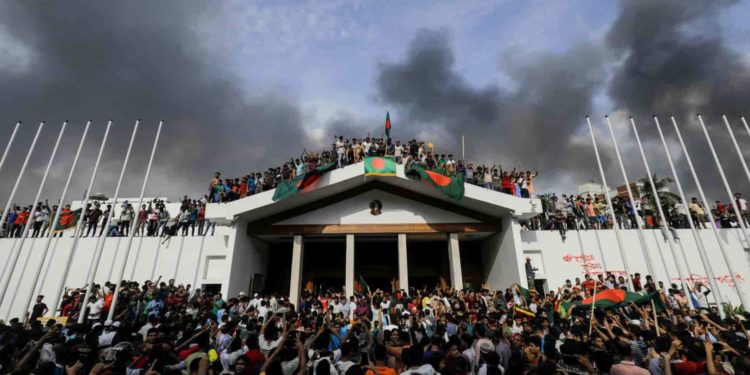PM Bangladesh Sheikh Hasina has resigned and the army head says an interim administration will take control. Bangladesh is amidst one of the most horrible crises and the entire state suffers from chaos. There are protests against the administration of state and they turn out detrimental.
In the unrest in Bangladesh, More than 300 people have died since July as student-led protests against Hasina have been reported. Bangladesh Prime Minister Hasina is now reportedly in India.
She resigned and fled from the state and the people of Bangladesh are enjoying this as their independence.
Amid protests, Bangladesh Army Chief Wakeruz Zaman announces the formation of an interim government in response to Sheikh Hasina’s resignation and departure.
Zaman Accepted Responsibility after the removal of Bangladesh Sheikh Hasina.
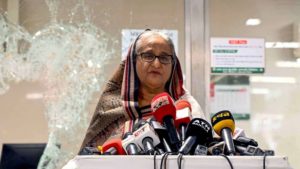
In a national address on state television, Wakeruz Zaman stated,
“We will form an interim government, and Hasina had resigned. I am taking full responsibility for Hasina’s removal. We are living in a revolutionary era. I vow to address all injustices, though it was unclear at first whether I would lead the new administration. It is time to put an end to the violence; the country has suffered greatly, the economy has been hurt, and many people have died.”
Moreover, Zaman announced that he would shortly meet with President Mohammed Shahabuddin to discuss the next steps after holding discussions with leaders of the main political parties, except Bangladesh Sheikh Hasina’s long-ruling Awami League.
As reported by Bangladesh’s Dhaka Tribune, he demanded an end to all violence in the name of protest after Bangladesh prime minister’s departure and pledged that the incoming government would guarantee justice for every fatality that occurred during the Anti-Discriminatory Student Movement.
Nonetheless, this chaos has not only taken the lives of people but also changed the course of affairs.
Thousands of people go to the streets in rebelliousness of a statewide curfew, internet services have been limited and offices have closed. After Bangladesh Prime Minister Sheikh Hasina departed from Dhaka, protesters attacked and took over the Prime Minister’s palace amid the chaos.
Reactions of the world to Bangladesh sheikh Hasina’s resignation and departure
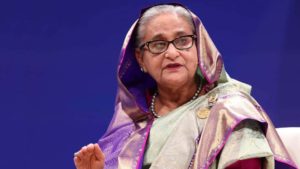
Following weeks of violent protests, Bangladesh PM Sheikh Hasina resigned and fled the state, which has sparked a variety of responses from people all over the world.
Nationalist Party of Bangladesh
Hasina’s resignation was welcomed as a victory of the people’s power by Tarique Rahman, the acting chairman of the Bangladesh Nationalist Party (BNP), who is now living in exile. Rahman said in a statement on X that Bangladesh be transformed back into a developed, democratic country while guaranteeing the protection of the liberties and rights of every individual.
United Kingdom
A spokesman for British Prime Minister Keir Starmer voiced grave worry about the violence and fatalities that occurred during the events where Bangladesh women and Bangladesh man were protesting, stressing the need to protect the right to peaceful protest.
David Lammy, the foreign secretary, also demanded a comprehensive UN-led probe into the latest events. Celebrations started in Whitechapel, London, where a large Bangladeshi population lives, as people signaled flags and shouted in honor of what some saw as the second independence in Bangladesh after Bangladesh sheikh Hasina’s resignation.
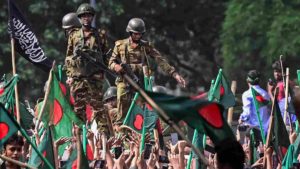
Germany
Despite the ongoing disturbance in Bangladesh sheikh Hasina, a representative for the Federal Foreign Office emphasized how crucial it is that Bangladesh stay on the democratic road.
America
The US urged all sides to refrain from any violence and praised the Bangladeshi army for its self-control. Matthew Miller, a spokesman for the Department of State, confirmed reports that the army was challenging orders to suppress protesters, which he characterized as a good development. The White House much-admired the army’s restraint and reiterated calls for a democratic and inclusive Interim Government. Senate Majority Leader Charles Schumer highlighted the need for quick democratic elections and a balanced Interim Government while applauding the demonstrators’ bravery.
United Nations
UN Secretary-General Antonio Guterres called for an orderly and peaceful handover while highlighting the importance of an open inquiry into the violence. UN Special Rapporteur Irene Khan emphasized Bangladesh’s future problems while expressing hope for a peaceful transition and accountability for current abuses of human rights.
Russia
The Russian Ministry of Foreign Affairs, which has cordial ties with Bangladesh, voiced optimism for a speedy return to constitutional principles in that nation after Bangladesh prime minister department.
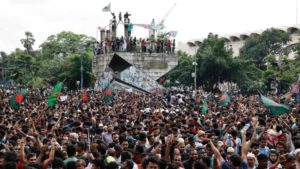
India
Indian media reports claim that Prime Minister Bangladesh sheikh Hasina has arrived at a military base close to Delhi. Bangladesh’s President has ordered Khaleda Zia and those detained during the rallies to be released due to the growing crisis.
According to military announcements, the curfew will be removed at dawn on Tuesday, offering a little break from the difficult circumstances.
Student protest organizations have called for the removal of a contentious government employment quota system. This demand has grown into a drive to remove Bangladesh Sheikh Hasina, elected to a fourth term in January despite the opposition’s boycott.


